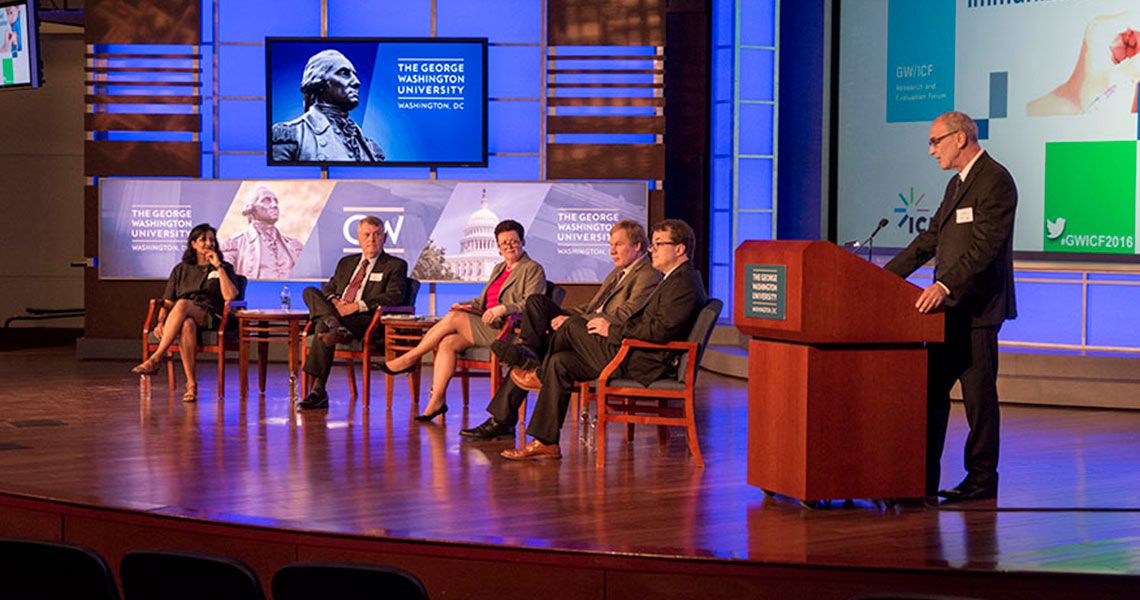The long-term effects of childhood immunization can be a controversial subject in almost any setting. Recently, a panel of experts speaking as part of the George Washington University (GW) and ICF International Sixth Annual Research and Evaluation Forum sought to move past the polemics and unravel some of the issues surrounding the practice.
As a child in 1950s England, Robert Miller, senior associate dean for research at GW’s School of Medicine and Health Sciences (SMHS), recalled during his welcoming remarks that immunization was a big issue, due to a lack of access to the services.
Today, he said, the United States develops and distributes vaccines that are incredibly effective, but the issue has turned from access to safety. Many wonder whether vaccines are in any way compromising the health of children.
Moderator Lisa Guay-Woodford, Richard L. Hudson Professor of Pediatrics and associate vice president for clinical and translational research at the George Washington University, and director of the Clinical and Translational Science Institute at Children’s National Health System, moderated the discussion, taking the stage after Miller to kick off the discussion.
The conversation quickly turned to one of fear surrounding vaccines —that they cause autism, despite many studies finding no link between the two.
“Children are receiving a lot of vaccines at the same time that a lot of their genetic or pre-disposed disorders are appearing, and so it’s very difficult to completely disprove temporal links,” explained panelist Anjali Jain, M.D., vice president of the Lewin Group, a health services research and policy organization based in Falls Church, Virginia.
Typically, autism symptoms are not prevalent until the child is about 2 to 3 years old, said Kevin Pelphrey, Ph.D., the Carbonell Family Professor in Autism and Neurodevelopmental Disorders and director of the Autism and Neurodevelopmental Disorders Institute at GW.
He added that when it comes to the link between autism and vaccines, “as far as an issue can be settled, it’s settled.
“There’s really not anything else that science can do, at least the science of autism, to help refute the persistent claims,” he said. “But I do see a reduction in the number of parents who ask me about this.”
Fortunately, despite the controversy, most U.S. children still receive vaccinations. In fact, according to the Centers for Disease Control and Prevention’s (CDC) 2015 national immunization survey, immunization coverage remained above 90 percent for the vaccines that prevent measles, mumps, and rubella (MMR); poliovirus; hepatitis B; and varicella.
CDC recommends that from birth through 6 months of age that children receive shots for chickenpox, diphtheria, hib, hepatitis A and B, influenza, MMR, meningitis, pertussis, polio, pneumococcal, rotavirus, and tetanus.
It’s a lot of vaccines and shots in a short amount of time, and there are parents who worry whether it’s simply too much. “[A child] getting a shot is a fairly traumatic event. It hurts, they’re screaming, and then a month, two months later, they’re getting another one,” Jain said.
When it comes to the health of their children, parents should question everything, “which is exactly what we should do in science,” Pelphrey said. Those questions should not be ignored or brushed aside, he added.
He recounted a time years ago when he brought his daughter, who has autism, to the pediatrician. Looking to get the provider’s thoughts on the issue of autism and vaccinations, he brought it up.
“I was concerned, and I asked, and it was actually a very gruff response: ‘You’re a neuroscientist, you should know better.’ At that time I wasn’t involved in autism research, and it just shut down the conversation. That was the last time I went to that pediatrician; it was really offensive,” he recalled.
The other panelists agreed about the importance of pediatricians and clinicians showing empathy and respect when communicating information to worried parents.
That can include orientation sessions for parents to give them more time than a 15-minute appointment to answer questions and address concerns, Pelphrey said. Practices also can post information on their websites and on Facebook.
Trust is an important part of the process of alleviating parents’ fears, said Glen Nowak, M.D., director of the Grady Center for Health Risk Communication at the University of Georgia. Trust in the health care system can be hard to build, and it requires an investment of time and a true commitment, he said. Providers need to make sure they are looking closely for ways to build that trust. Communicating in a way that is more than just giving people another fact sheet or having them watch a video is a good start.
Jain added that today, providers are “still acting like we have all the answers.”
“I think trust is better communicated or better conveyed if we admit what we don’t know. If we admit that things can go wrong, that the vast majority of diseases that we’re dealing with these days don’t have a cure. … We’re all working in probabilities,” she said.
Admitting that, Jain said, can open the door to a more honest, two-sided conversation and a better understanding between parents and pediatricians.



